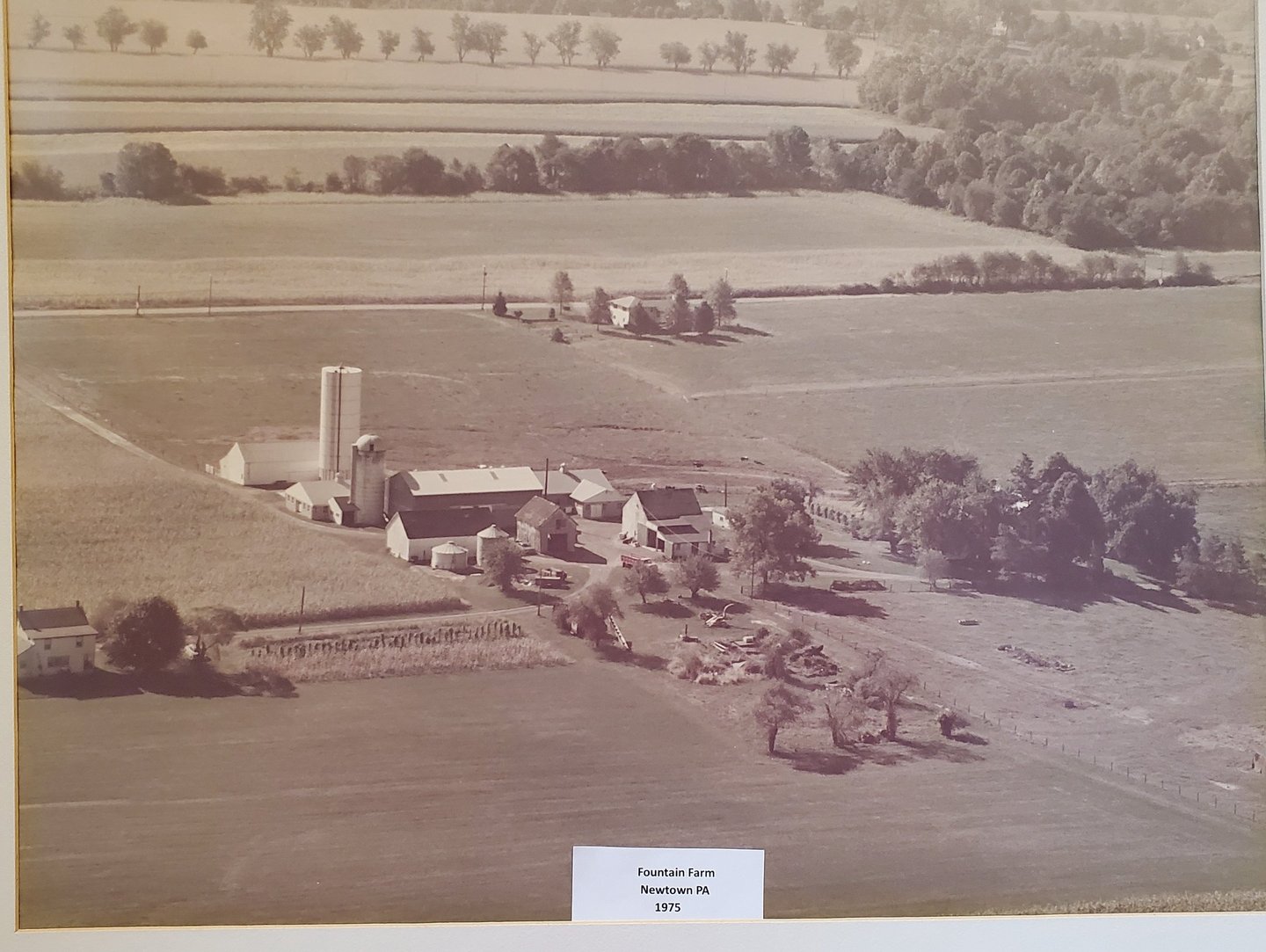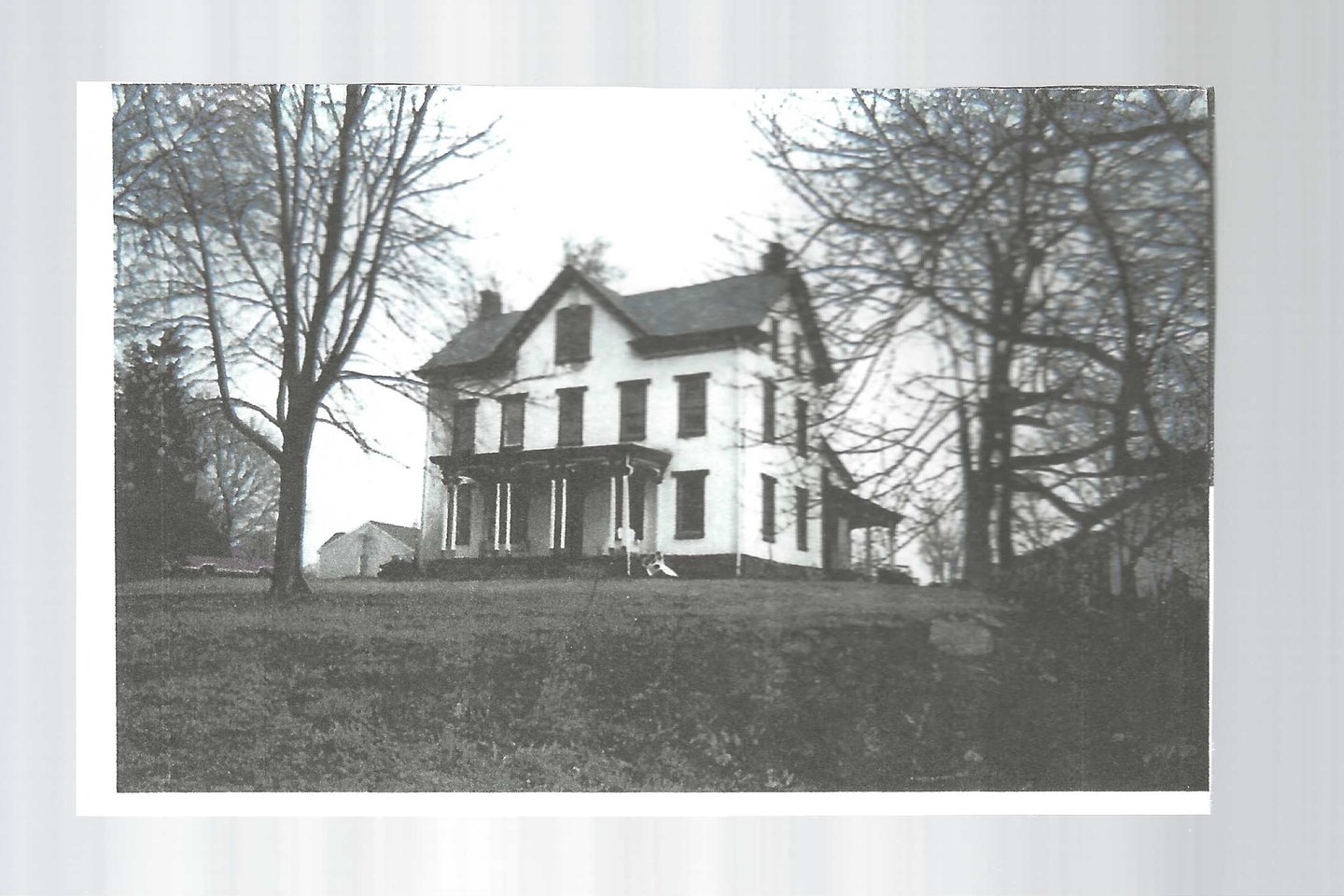Fountain Farm
Rte. 413 Newtown PA. This historic and progressive dairy farm was purchased in 1946 John Carter Thompson Sr. and Audrey Stradling Knowles Thompson. The farm was sold in 1976 to their sons John C Thompson Jr. and Harry E. Thompson who operated the farm until 1987.




Fountain Farm was a beautiful 135-acre dairy farm located just south of Newtown in Newtown Township, Bucks County PA. The farm was bordered to the west by Rte. 413, bordered on the south by Doublewoods Road and Middletown Township, and bordered on the north by Lincoln Avenue and Lafayette Street. The farm was purchased in 1946 by John C Thompson Sr (1899-1975) and his wife Audrey Knowles Stradling Thompson (1895-1989). After 22+ years of share-cropping at the Silver Lake Farm, the Penn Arco Farm, and the John Buckman Farm, this hard-working couple and their six children moved to Fountain Farm. A successful business partnership among John Sr, John Jr, and Harry was established.
The dairy herd of registered purebred Holsteins was the primary focus. Numbering about 160 cows in all, the number of milking cows was 70-80 at any one-time. Primarily the farm raised crops of corn, barley, alfalfa, sorghum, timothy, and clover to support the dairy operation. At times vegetables such as peas, potatoes, and sweet corn were grown commercially; a few chickens and pigs were raised also. The farm family was quite progressive and forward thinking. They were the first in the county to install a glass pipeline to move milk directly from the cows to a large stainless steel cooling tank located in the milk house. They were the first to own a self-propelled pea harvester in the county. The Thompsons were a founding family in 1948 of the annual and still operating Middletown Grange Fair; it was started to promote agriculture. The partnership was quite active in local, state, and national dairy and farming organizations, as well as several civic organizations.
In 1975, John C Thompson Sr died; in 1976 Mrs. Thompson sold the farm to two of their sons, John C Thompson Jr (wife Anne) and Harry Edwin Thompson (wife Ailene). Several children grew up on the farm: Jack, Kathy, Ed, Joanne, Susan. Growing up on Fountain Farm was a Norman Rockwell moment. The Thompsons continued the farm operation until Newtown Township became over-populated. Farming became too difficult to continue. The property was sold to a home developer in 1987.
-------------------------------------------------------------------------------------------------------------------------------
In the 1876 History of Bucks County (page 202), author William W.H. Davis relates how Fountain Farm is mildly connected to the infamous Walking Purchase of 1737. Davis explained that the farm passed through several owners from 1680s with Christopher Taylor, then to a son Israel Taylor, then to James Yates (sometimes spelled `Yeates'), then to Samuel Cary (who called the property `Retirement'), then to his son, then to Nathaniel Burrows, then to Thomas Porter (who ran a school on the property), then to David Roberts, etc.
Davis wrote "...the farm belonged to John B. Tomlinson who pulled down the old house, built 1741, and erected a new one, 1878. He called the place `Fountian Farm'. The James Yeates who owned this farm after Israel Taylor, is said to have walked the Indian purchase of 1684, and it was subsequently owned by his son James, who was one of the walkers in the `Walking Purchase,' 1737, but gave out the morning of the second day and lived but three days. These facts make the pace of historic interest."
The connection between Fountain Farm and the Walking Purchase is that one of the walkers (James Yeates) was the owner of Fountain Farm around the time of the now historic walk. Fountain Farm was not physically connected to the Walking Purchase. The Walking Purchase territory started near Wrightstown (northwest of Newtown) heading northwest into Lehigh County. The Walk then proceeded to make a right turn and head northeast toward the Delaware river ending in present-day Monroe County. The walking territory was huge, almost the size of the state of Rhode Island. The Delaware Indians (part of the Lenape tribe) felt cheated and protested a spurious contract, but to no avail. The Walking Purchases of 1684 and 1737 have extremely interesting and controversial histories; the topic is worth additional research.
